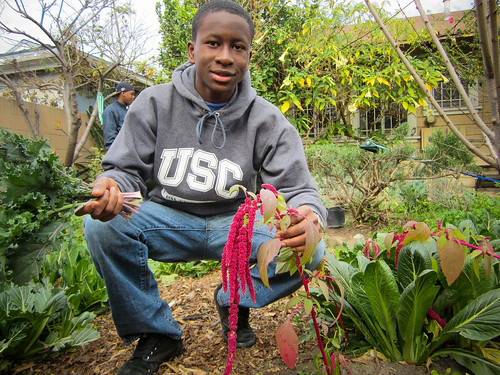
It began with the desire of a group of South Los Angeles high school students to increase access to more effective nutrition education at their school. They started small—a monthly guest speaker, bags of veggies, cutting boards, and nutrition education. Now, their efforts have blossomed and manifested into RootDownLA, a community food project operating in three South Los Angeles neighborhoods with the help of the youth participants, referred to as Cultivars.
As a recipient of a $226,705 Community Food Project grant from the U.S. Department of Agriculture’s National Institute of Food and Agriculture (NIFA), this youth-driven organization works closely with members of the community to grow fresh fruits and vegetables and provide access to more quality food. The major encouragement of all of RootDown LA’s activities is for people to choose to eat good food.
“In 2012, the NIFA grant let us develop a 13-week training program that prepares youth to increase supplies of fresh food in their communities,” said Megan Hanson, RootDown LA’s executive director. “Youth trainees learn to design, install, and maintain gardens that are located in the yards of homes that neighbor their schools. These youth also distribute food from gardens within the community.”
Hanson added, “We are making the consumption of fresh food a more realistic daily option for community members by growing food right in neighbors’ yards and promoting and distributing it both in and around the high schools where students and their families interact every day.”
The impact also goes beyond nutrition and access to food; RootDown LA provides employment for local youth to manage activities at their various sites. Many early participants are now paid staff who handle day-to-day operations and manage youth interns and the network of neighborhood gardens.
“The youth in our programs have had tremendous success demonstrating that they are completely capable of co-creating and facilitating effective nutrition, cooking, and horticultural programs that get more of their neighbors wanting to eat their veggies,” Hanson said.
NIFA’s Community Food Projects Competitive Grant Program administers all community food project grants, seeking to increase self-reliance within communities, access to quality foods, community outreach, and provide assistance to projects.
“There is that saying, ‘Tell me and I forget, teach me and I may remember, involve me and I learn.’ Well, RootDown LA taught me that it’s not about how much space you have, it’s about how you use the space,” said Jocelyn Ramirez, one of RootDown LA’s Cultivars. “Why feed your lawn when your lawn can start feeding you?”
NIFA’s mission: Invest in and advance agricultural research, education, and extension to solve societal challenges. NIFA’s vision: Catalyze transformative discoveries, education, and engagement to address agricultural challenges. For more information, visit http://nifa.usda.gov/.
